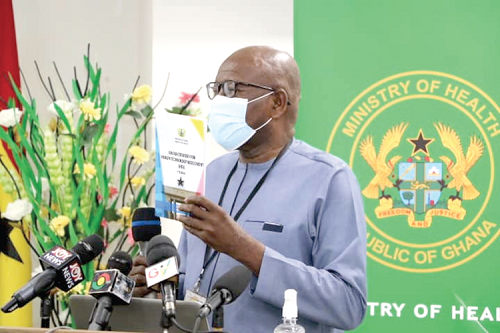
Value for money strategy in health sector launched
The Ministry of Health has launched a five-year health technology priority setting strategy that will help the selection of the best options regarding health interventions to boost value for money and health outcomes.
The strategy is known as "Ghana Health Technology Assessment Strategy" and is the first edition.
Health technology in the context of the strategy refers to medicines, vaccines, devices, procedures and systems developed to solve a health problem and improve quality of life.
The strategy will be used to evaluate the social, economic, organisational and ethical impact of health interventions and technology to inform policy decision.
It has been described as a multidisciplinary process that uses explicit methods to determine the value of health technology at different points in its lifecycle.
To help institutionalise the strategy, a secretariat and a technical working group chaired by the sector minister has been instituted.
The development, launch and implementation of the strategy is supported by partners such as the World Health Organisation (WHO), the Norwegian Institute of Public Health and the United Nations Development Programme.
Launch
In a speech read on his behalf at the launch of the strategy in Accra, the Minister of Health, Mr Kwaku Agyeman-Manu, said as a developing country prioritisation was critical for optimising the deployment of limited resources in the context of a lower middle-income status.
“These concepts are linked to people-centered care, essential packages, resources allocation and most importantly cost effective delivery of quality health services,” he said.
He said the Ghana Health Technology Assessment (HTA) strategy was aimed at collecting adequate and precise information needed to inform policy reviews and new policy formulations towards the delivery of equitable, efficient and high-quality health system.
“HTA typically involves analysis to assess whether a new health technology provides any additional benefit compared with current practice and at what additional cost,” he said.
Mr Agyeman-Manu said within the five-year rolling implementation period, it was envisaged that evidence-based decisions in the health sector would lead to net gains in reimbursement, contribution to optimum prices and efficient procurement.
“In 2013, the World Health Organisation (WHO) publication indicated that HTA is a tool to further advance the implementation of Universal Health Coverage (UHC) in terms of deciding who should be getting which intervention and at what cost.
WHO
In a speech read on his behalf, the WHO Country Representative, Dr Francis Kasolo, said HTA had been a tool used by governments to prioritise health interventions so as to inform the best way of allocating resources in a cost effective manner, taking into consideration country budgets and resources.
He said as countries strived to deliver UHC, the process of deciding which health technologies and interventions to invest in had become increasingly important.
Dr Kasolo said in lower middle-income countries such as Ghana, prioritisation was critical for optimising the deployment of limited resources.
“WHO, together with other partners, have been involved with the development and institutionalisation of HTA in many countries, including Ghana, and has recently conducted a global survey on HTA and Health Benefits Package (HBP) as part of efforts targeted at understanding the systematic description of the work relating to HTA carried out by national institutions in WHO member states.
“The survey was in response to World Health Assembly Resolution 67.23. This resolution — 'Health intervention and technology assessment in support of universal health coverage' — called on the WHO Secretariat to assess the status of HTA globally,” Dr Kasolo said.
Writer’s email:
